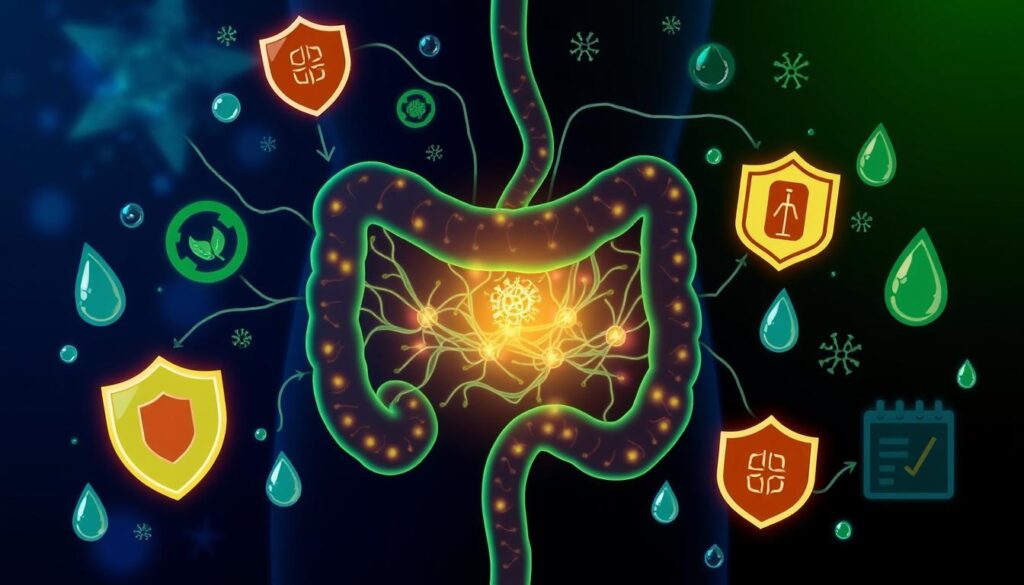In today’s world, having a strong immune system is more crucial than ever. Many people are looking for natural ways to boost their immune system. Water fasting, a method that’s gained popularity, has shown great promise in enhancing immunity through cellular regeneration and anti-inflammatory effects.
Research shows that water fasting can trigger autophagy, the body’s natural cleaning and recycling of damaged cells. This process not only gets rid of harmful toxins and pathogens but also makes new, healthy immune cells. Water fasting helps the immune system fight off infections and diseases better, making it a powerful tool for staying healthy.
Water fasting also has strong anti-inflammatory effects. Chronic inflammation can lead to many health problems and weaken the immune system. By reducing inflammation, water fasting helps immune cells work better, leading to a stronger immune response.
Key Takeaways:
- Water fasting promotes cellular regeneration through autophagy, boosting the immune system’s ability to fight off infections and diseases.
- Fasting stimulates the production of new, healthy immune cells, enhancing the body’s natural defense mechanisms.
- Water fasting exerts potent anti-inflammatory effects, reducing chronic inflammation that can weaken the immune system.
- By creating a favorable environment for immune cells to function optimally, water fasting leads to a more robust and efficient immune response.
- Incorporating water fasting into one’s lifestyle can be a powerful tool for maintaining optimal health and well-being.
What is Water Fasting and How Does it Work?
Water fasting means drinking only water for 24 to 72 hours. It’s an old practice that’s now popular for its health perks. These include better metabolic health, stronger immune function, and more autophagy, which cleanses cells.
Definition of Water Fasting
Water fasting means not eating or drinking anything but water. It’s different from other fasts, like juice fasting or intermittent fasting. People do it for health benefits and to detox and regenerate cells.
Physiological Effects of Water Fasting on the Body
When you fast, your body changes. It starts using fat for energy instead of sugar. This leads to ketosis, which is good for your health.
Water fasting also starts autophagy. This is when your body gets rid of old or damaged cells. It helps your immune system and might even help you live longer.
A small 2022 study of 48 individuals with overweight or obesity found a clinically significant reduction in both systolic and diastolic blood pressure after a 10-day water-only fast and five days of refeeding.
Water fasting also improves other health markers. For example, it can lower blood pressure and improve insulin sensitivity. It can also reduce inflammation and boost your immune system.
- Reduced blood pressure
- Improved insulin sensitivity
- Decreased inflammation
- Enhanced immune function
- Increased weight loss
| Health Benefit | Research Findings |
|---|---|
| Blood Pressure Reduction | 90% of individuals with hypertension who underwent a medically supervised water fast saw their blood pressure normalize afterward. |
| Insulin Sensitivity Improvement | Fasting for three days or longer led to a 30% reduction in circulating insulin levels in the body. |
| Weight Loss | A study of 12 middle-aged men found that a medically supervised eight-day water fast led to an average weight loss of 13 pounds. |
Water fasting has many benefits, but it’s not for everyone. People with diabetes or other health issues should talk to a doctor before trying it. Always fast under the guidance of a healthcare professional.
Fasting Stimulates Immune Cell Regeneration
Fasting boosts the body’s immune system by regenerating immune cells. It makes the immune system stronger and more resilient. When we fast, our body goes through changes that help our immune system work better.
Studies show fasting for 24 hours can make old blood stem cells work like they’re young again. These stem cells are key to a strong immune system. Fasting makes these cells use fat for energy instead of carbs, helping them regenerate better. Research from the University of Southern found fasting can also reduce the side effects of chemotherapy and reverse age-related immune decline in mice.
Autophagy: The Body’s Natural Cellular Cleansing Process
Fasting boosts the immune system by activating autophagy. Autophagy is a process where cells clean out damaged parts. This helps remove toxins and debris that can harm the immune system.
Autophagy is crucial for old blood stem cells to survive and function well. It keeps these cells healthy, supporting the immune system.
Fasting Promotes the Production of New White Blood Cells
Fasting also boosts the production of new white blood cells. These cells are vital for fighting infections. Research shows fasting can double the regenerative capacity of intestinal stem cells in mice.
| Fasting Duration | Effect on Immune System |
|---|---|
| 24 hours | Nearly restores youthful capacity in old blood stem cells |
| 48-120 hours | Activates pathways that enhance cellular resistance to toxins and stress |
| Multiple cycles | Decreases immunosuppression, reduces chemotherapy-related mortality, and reverses age-dependent myeloid-bias in mice |
Fasting helps create new white blood cells and improves the function of existing ones. This strengthens our body’s defense against diseases and infections. It could also help prevent and treat age-related conditions and improve cancer treatments.
Reducing Inflammation Through Water Fasting
Chronic inflammation is a silent threat to our immune system. It can lead to heart disease, diabetes, cancer, multiple sclerosis, and inflammatory bowel diseases. But, recent studies show water fasting can help reduce inflammation and boost our immune function.
How Inflammation Weakens the Immune System
Inflammation is a natural response to injury or infection. But, chronic inflammation can weaken our immune system. It makes us more likely to get sick.
Chronic inflammation is marked by the constant release of pro-inflammatory cytokines and increased oxidative stress. This can harm healthy cells and tissues.
A study in the journal Cell found chronic inflammation can lead to serious health issues. These include:
- Heart disease
- Diabetes
- Cancer
- Multiple sclerosis
- Inflammatory bowel diseases
Anti-Inflammatory Effects of Fasting
Water fasting has strong anti-inflammatory effects. It restricts calorie intake, which reduces pro-inflammatory cells in the blood. A study at Mount Sinai Health System found intermittent fasting lowers these cells’ inflammation.
“Fasting reduces inflammation and improves chronic inflammatory diseases without affecting the immune system’s response to acute infections.” – Cell study
Fasting’s anti-inflammatory effects work through several mechanisms. These include:
| Mechanism | Effect |
|---|---|
| Reduction in monocytes and lymphocytes | Decreases inflammation in the blood and peripheral organs |
| Alteration of monocyte egress and lymphocyte accumulation | Modulates immune cell trafficking and function |
| Inhibition of NLRP3 inflammasome activity | Protects against inflammation by modulating immune cell responses |
| Activation of liver AMPK-Pparα pathway | Controls peripheral monocyte levels in response to fasting |
Water fasting reduces inflammation through these mechanisms. It helps restore balance to our immune system. As research continues, fasting’s potential as a treatment for inflammatory diseases grows.
How Water Fasting Boosts Your Immune System Naturally
Water fasting boosts your immune system in many ways. It helps your body regenerate cells and reduces inflammation. This makes your body’s defenses stronger, helping you fight off infections and diseases better.

Studies show water fasting’s big impact on the immune system. A study at the Memorial Sloan Kettering Cancer Center found fasting twice a week boosts cancer-fighting cells in mice. These cells use fatty acids for energy, making them more effective against cancer.
Also, fasting changes where these cells are found in the body. Cells in the bone marrow get more Interleukin-12, and spleen cells use lipids better. This means water fasting could make these cells work better against tumors and inflammation.
“Fasting is a simple dietary intervention that can significantly increase the activity of these important immune cells,” said Dr. Miriam Merad, co-lead author of the study and Director of the Precision Immunology Institute at the Icahn School of Medicine at Mount Sinai.
Water fasting also boosts the production of new white blood cells and promotes autophagy. This natural cleaning process reduces oxidative stress and inflammation. It helps your immune system work at its best.
| Fasting Period | Number of Subjects | Identified Proteins | Differentially Expressed Proteins |
|---|---|---|---|
| 6-day Short-term Intensive Fasting (STIF) | 31 | 1009 | 84 |
| 6-day Gradual Refeeding Period | 31 | 1009 | 84 |
A study with 31 subjects found 1009 proteins in red blood cells after six days of fasting and six days of refeeding. It found 84 proteins that changed between fasting and refeeding. Gene set enrichment analysis showed the immune system was more active on fasting day 6.
Water fasting is a natural way to boost your immune system. It promotes cell regeneration and reduces inflammation. This helps your body fight diseases and stay healthy.
Fasting Enhances Metabolic Health and Immune Function
Fasting has become popular for its health benefits. It’s not just for losing weight or living longer. It also boosts metabolic health and immune function. Fasting changes how our body uses energy, improves insulin use, and strengthens our immune system.
Fasting makes our bodies better at using insulin. When we fast, we use stored energy instead of food glucose. This makes our cells more efficient at using insulin, lowering the risk of diseases like type 2 diabetes. A study in the Journal of Clinical Endocrinology & Metabolism showed fasting improves insulin use in overweight people.
Fasting also boosts our immune system. It triggers autophagy, a process that cleans up damaged cells. This reduces inflammation and helps our immune cells work better.
Improved Insulin Sensitivity and Glucose Regulation
Insulin sensitivity and glucose control are key to good health. Fasting helps in these areas. For example, fasting turns on SIRT1, a protein that helps manage energy and glucose.
“Fasting during Ramadan has been reported to reduce proinflammatory cytokines and immune cells in healthy subjects by 32%.” – Faris et al., 2012
Fasting also lowers inflammation. This is good because inflammation can make it hard for our bodies to use insulin and glucose well. With less inflammation, our bodies can use glucose better.
Positive Impacts on Immune Cell Function and Signaling Pathways
Fasting is great for our immune system. It changes our gut bacteria, which is important for our immune health. Fasting promotes good bacteria that help our immune system.
It also affects how our immune cells work. For example, fasting changes the mTOR pathway, which is important for cell growth and survival. This helps our immune cells work better.
| Study | Fasting Protocol | Key Findings |
|---|---|---|
| Cignarella et al., 2018 | Intermittent fasting | Conferred protection in CNS autoimmunity by altering the gut microbiota |
| Ajona et al., 2020 | Short-term starvation | Reduction in IGF-1 levels, sensitizing lung tumors to PD-1 immune checkpoint blockade |
| Di Biase et al., 2016 | Fasting-mimicking diet | Reduced HO-1 levels and promoted T cell-mediated tumor cytotoxicity |
In conclusion, fasting is a powerful tool for better health. It improves insulin use, glucose control, and immune function. As research shows more benefits, fasting’s role in health is clear.
Gut Health, Microbiome, and Immunity: The Fasting Connection
The human gut is a home to many microorganisms. These include about 200 different species of bacteria, viruses, and fungi. This complex community, known as the gut microbiome, is key to our health and well-being. It plays a big role in our immune function. Research shows fasting can greatly impact our gut health and immunity by making beneficial changes in the gut microbiome.

Studies found that a diverse gut bacteria is linked to less risk of diseases like diabetes and inflammatory bowel disease (IBD). A diverse gut microbiome also means better mental and physical health. Fasting boosts the diversity of gut bacteria and increases beneficial bacteria like Faecalibacterium prausnitzii and Akkermansia muciniphila. These bacteria support our intestinal health and immunity.
Fasting Promotes Beneficial Gut Bacteria Populations
Fasting changes our gut microbiome in many ways. For example, during Ramadan fasting, the gut microbiome changes, with more Akkermansia muciniphila and Bacteroides fragilis group. A 10-day Buchinger fasting period also changes the gut microbiota composition. These changes help improve our immune function and overall health.
Fasting also promotes beneficial gut bacteria, improves gut-related metabolites, and reduces inflammation. Animal studies show fasting can alter the gut microbiota, promoting intestinal regeneration and reducing inflammatory bowel disease pathology. By supporting a healthy gut microbiome, fasting may enhance our immune function and overall well-being.
| Factors Influencing Gut Health | Effects on Gut Microbiome |
|---|---|
| Processed and sugary foods | Decrease the amount of “good” bacteria and diversity |
| Chronic high levels of stress | Stress hormones may compromise gut health |
| Lack of quality sleep | May impact gut health and contribute to sleep issues |
| Eating slowly and chewing food thoroughly | May lower chances of developing obesity and diabetes, promoting a healthy gut |
| Drinking plenty of water | May increase the diversity of bacteria in the gut and promote gut health |
| Consuming high-fiber foods (legumes, whole grains, vegetables, nuts, fruits) | Has a positive impact on gut health |
| Garlic consumption | May increase gut microbiome diversity and improve gut health |
| Fermented foods (kimchi, sauerkraut, yogurt, kefir) | Dietary sources of probiotics that support gut health |
| Collagen-rich foods (bone broth, salmon skin) | May be beneficial for gut health |
The gut microbiome is influenced by many factors, including diet, environment, antibiotic use, stress, sleep, and genetics. This results in individual variations. While fasting seems to benefit the gut microbiome, more research in humans is needed to fully understand its effects and potential applications in promoting gut health and immunity.
Implementing Water Fasting Safely and Effectively
Water fasting can boost your immune function and health. But, it’s important to do it safely and with care. Follow guidelines for fasting duration, frequency, and breaking the fast to ensure a safe experience.
Preparing for a Water Fast
Before starting a water fast, prepare your body slowly. Start by eating less and drinking more water a few days before. This makes the transition easier and reduces discomfort.
Choose a time to fast when you can rest and relax. You might feel less energetic at first.
Duration and Frequency of Water Fasting
The right fasting duration and frequency vary based on your health, goals, and fasting experience. Beginners should start with short fasts, like 24 to 72 hours. Then, they can gradually increase the time.
A 2019 study with 1,422 participants showed benefits from fasting for 4 to 21 days.
| Fasting Type | Duration | Frequency |
|---|---|---|
| Intermittent Fasting | 16-24 hours | Daily or weekly |
| Short Water Fast | 24-72 hours | Once per month |
| Extended Water Fast | 3-21 days | 1-2 times per year |
Listen to your body and don’t overdo it, especially if you’re new to fasting. If you feel bad or have concerning symptoms, stop fasting and talk to a doctor.
Breaking a Water Fast Properly
Breaking a fast correctly is as important as the fast itself. Start with small, easy-to-digest foods like fruits and vegetables. Slowly add more foods over a few days.
Begin with a meal that’s half the size of what you normally eat. Wait a few hours before eating again. Gradually increase your food portions and variety over the next few days.
By following these guidelines, you can safely add water fasting to your routine. It can help your immune system and overall health.
Precautions and Potential Risks of Water Fasting
Water fasting can be good for your health, but it’s important to be careful. Before starting a water fast, know the risks and precautions. This ensures a safe and effective fasting experience.
Individuals Who Should Avoid Water Fasting
Not everyone can safely fast from water. People with diabetes, chronic kidney disease, or eating disorders should not fast. Pregnant women, nursing mothers, and those who are underweight or recovering should also avoid it. Always talk to a doctor before fasting to see if it’s right for you.
Monitoring Health During a Fast
If you’re okay to fast, watch your health closely. Look out for dehydration, electrolyte imbalances, and other bad effects. Signs like dizziness, fatigue, headaches, and muscle cramps are common.
If you notice any serious symptoms, stop fasting right away. Seek medical help if needed. A doctor’s guidance can help make fasting safer and more beneficial.




